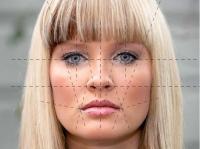
The latest face recognition technology works by gathering information about all that is in public domain through diverse channels of cloud computing, including various social networks and blogs. You point a camera on someones face and you get to see information about the person name, address, contact details and much else. You might even be able to get access to things like personal account numbers, sexual orientation, credit ratings, personal interests, etc.
This kind of technology is already available, but facial recognition is not an immediate threat to the privacy of most people. This is because in case of most individuals lot of data is still not publicly available. That may, however, change in very near future. The system of digital surveillance is only going to get better. As technology improves it will give rise to myriad ways of quickly collecting large amounts of information, by using only publicly available data. Partial records can be constructed and then filled out as potential targets are identified.
By the end of this year the worlds population is going to hit 7 billion. Undoubtedly this is a huge number, but it still pales in comparison to the 60 billion to 100 billion photos Facebook has reportedly stashed away inside its gargantuan servers. Even if you are not on Facebook, chances are your digital photographs are there.
Facebook, and its newest competitor, Google+, already have the tag feature in their networking sites. When users add pictures to their pages, the feature will use facial-recognition software to suggest names of people in the photos to tag based on pictures in which they have already been identified. While such a system makes things convenient for users, on rare occasions it can also lead to their being tagged in pictures that show them in bad light.
Knowing that someone can snap a photo of your face with their smartphone and then find a way of accessing all kinds of personal information, including your home address and contact details, is a bit worrisome. But that does not mean we should start putting roadblocks in the path of this new technology. Like any other technology, face recognition software is going to be a mixed bag. When put into the right hands, facial recognition software can do some pretty amazing things.
For instance, we could have software based on face detection that allows us to tag the hundreds or thousands of pictures that we have in our computer or in Facebook accounts by the basis of person. In the hands of law enforcement officials, this technology can obviously be used to identify the bad guys. Airports, railway stations and other places that see heavy amount of footfalls have already started employing face detection technology for surveillance purposes.
Google has revealed that it has built a facial recognition technology for smartphones that is known as Google Goggles. But the company has refrained from releasing it into the market. Perhaps the company realised that todays privacy conscious generation would not like being identified after being looked at through a smartphones lens. While living in a digital world, we tend to leave digital footprints all over the Internet. Interested parties can always track our movements.
The potential ethical challenges of face-recognition technology have been a sensitive subject for technology companies, particularly as it is bound to grow more sophisticated - and become available in smartphones. But we also need to accept that face detection is a technology whose time has come. Further developments in this field cant be stopped, and the technology will keep getting better and better with time. In any case, face detection is not the only technology that can invade in the private space. The one that immediately springs to my mind is law enforcements use of GPS tracking devices.
With time our notions of privacy keep changing. Privacy is, after all, a contextual and subjective concept. Given facial recognition technologys increasing adoption, it is possible that at some point of time, we might start expecting to be recognized by people who are complete strangers. That is the way the society could evolve. There are many ways by which recognition by random strangers could become an asset, instead of a threat.

 In
In
Add new comment